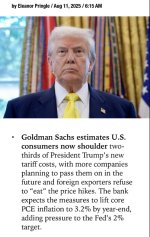Tomatoes are a huge "cha-ching" for big pharma.Mexico has set minimum export prices for fresh tomatoes to protect its domestic production and ensure internal supply after a bilateral agreement with the U.S. expired, Mexico's economy and agriculture ministries said in a joint statement on Sunday.
The decision follows Washington's withdrawal in July from a 2019 deal between the two countries which regulated Mexican tomato exports to the U.S..
The Trump administration on July 14 announced a duty of about 17% on imports of fresh tomatoes from Mexico.
While the new pricing rules apply exclusively to definitive exports, they don't restrict export volumes or impose maximum prices. Prices will be reviewed annually or sooner if market conditions demand, the Mexican ministries said.
Guess the Mexican Exporters aren’t gonna eat the Trump Tomato Tariffs.
Mexico sets minimum export prices for fresh tomatoes — Reuters
Mexico has set minimum export prices for fresh tomatoes to protect its domestic production and ensure internal supply after a bilateral agreement with the U.S. expired, Mexico's economy and agriculture ministries said in a joint statement on Sunday.apple.news
. Minimum export prices per kilogram are set at $1.70 for cherry and grape tomatoes, $0.88 for Roma tomatoes, $0.95 for round tomatoes, and $1.65 for round tomatoes with stems. Other varieties, such as cocktail and heirloom tomatoes, will also have a minimum price of $1.70.
According to official figures, Mexico exported $3.3 billion of tomatoes last year.
"This action reinforces the government's commitment to agricultural competitiveness, dignified rural employment, and food sovereignty," the ministries said.
The ministries added that Mexican associations of tomato producers have expressed support for the agreement, which entered into force immediately after its publication on August 8 in the government's official gazette.
View attachment 30499
Think about it eh. What goes on pasta, pizza, burgers, potatoes, tacos and compliments the flavour of high density fats in cheese as well as the vegetable and seed oils they are cooked with or in salad dressing?
Botswanan pink kale? Fuck no.
'Maters goes with them thar stuffs.


